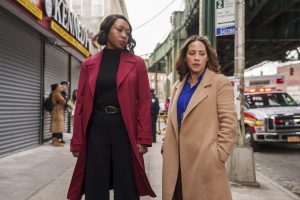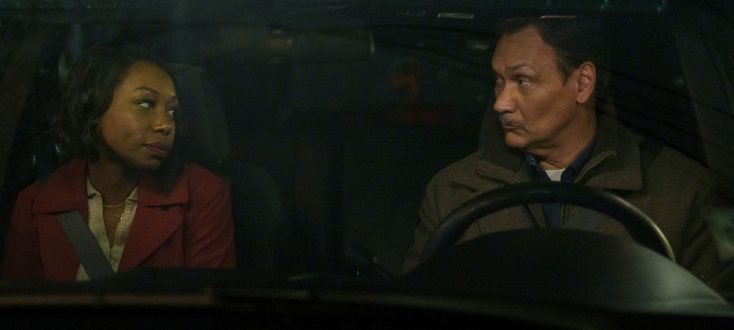
(L-R): Amanda Warren as Regina Haywood and Elizabeth Rodriguez as Det. Crystal Morales in EAST NEW YORK. ©CBS. Broadcasting. CR: eter Kramer/CBS ©2022 CBS Broadcasting, Inc.
By JUDY SLOANE
Front. Row Features
HOLLYWOOD-CBS’ new drama “East New York,” stars Amanda Warren (“The Leftovers,” “Madam Secretary”) as Deputy Inspector Regina Haywood, the newly appointed boss of the 74th Precinct in East New York, who is determined to use innovative and creative ways to help protect the community. She is aided by her mentor, Chief John Suarez (Jimmy Smits, “NYPD Blue,” “L.A. Law,) in confronting the occasional conflicts between the police and the people they serve.
Co-created by Mike Flynn (“Big Sky) and William Finkelstein (“Brooklyn South”) the series premieres on CBS at 9:30 p.m. on October 2, 2022, before moving to its regular 9:00-10:00 p.m. time slot on October 9th. Jimmy Smits and Amanda Warren spoke with the TV Critics Association about their original take on an old format.
Q: Jimmy, you’ve done law enforcement roles for a number of years. What have you learned about them?
Jimmy Smits: I think that’s a discussion that we’ve had as a cast and with the creators of the show in an ongoing way. The bottom line is that people get into law enforcement to be, as President Obama said, a guardian, not a warrior. And that’s what we have to remember, that we’re there to protect and serve the people of the community that we’re involved in, in this instance, East New York.
I’m going to throw it to my partner, Amanda Warren, because her particular character is in a position of power now and is trying to change that dynamic [with] the different officers that are involved.
Amanda Warren: I haven’t really played a lot of cop characters or legal characters, like my partner who has tossed it to me. But what I can say is she is in very much a conventional space doing unconventional things in a very diverse environment. She is trying something that is new and, with that, there is some resistance to breaking habit. So with that comes your inherent and organic conflict, which is always great for drama and storytelling, and we see her navigate through what works, what might not work, what is met with resistance, and she still believes and needs to have another go.
Q: What sort of questions did you have about your characters’ unique approach to this process of trying to bridge the gap between the police and the people they serve?
Warren: Her approach comes from her being well-equipped and compartmentalizing things, meaning people’s personal feelings, as to how she goes about things. And she’s got a really thick skin.
When I’m approaching her in a scene, it is about: What is this moment right here? And she confronts it head on, and she blocks out all of the noise. I think she is supremely skilled at dealing with the issues at hand. However, some things do inevitably cause a chain reaction, and that’s what feeds our story.
Q: Jimmy, how much do you feel the New York of the show reflects the New York that you know, that you grew up in, that you come back to?
Smits: I think that the show really does reflect, I want to say, the new New York. Certainly, given the episodes that we’ve been filming in this particular neighborhood, with this particular set of people, both law enforcement and the citizens of the community, we’re reflecting a more truthful image of the interplay between the community and law enforcement.
Q: When you run into a cop, and they recognize you, do they share with you the dilemma they feel about being wanted and also being reviled?
Smits: I think that’s part of the dynamic that we’re going to be dealing on a week-to-week basis, and those are the stories that our group of writers are really wanting to tell, that dynamic that happens when you encounter law enforcement, usually at times when you need help the most, and what happens there.
I think the stories that we’ve been going through in the past couple of weeks in terms of filming touch on all of those and how there has to be a shift in the paradigm in the way law enforcement perceives the people they’re supposed to be helping.
Q: Amanda, how has the adjustment been for you becoming the lead in a TV series?
Warren: As far as my name happening to be at the top of the call sheet, it just goes back to basic leadership skills that I didn’t really pay attention to after high school. To make sure that everyone is okay, comfortable, feels safe and feels like their thoughts are valued and respected. It’s important to make sure that the ride goes smoothly, and to be prepared myself as an actor and storyteller.
It’s just longer hours, the stamina, and training my body to be ready and embrace the hours, rather than pushing against it. It’s a lot of work, but it’s been the best time ever. Going to work every single day is what I dreamed of. So it’s a good type of exhaustion. We all come to work, and then we all leave with nothing left in the tank. We all give it our all, and we are very excited for everyone in America, and some places around the world, to get to see it.





